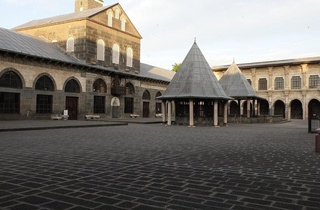Eid al Fitr, is normally celebrated with mosque prayers, family gatherings, shopping for new clothes, gifts and candies. But many countries have banned mass praying gatherings in a move to contain the spread of coronavirus pandemic, which have so far killed more than 344,000 people around the world.
In Diyarbakır, one of the cities of southeastern Turkey, citizens woke up to a quiet morning. The city's busiest streets and squares are empty and silent. Muslims had to perform Eid al Fitr prayers at home.
Police have been patrolling the city, setting up checkpoints at several points while residents have stayed at home.
What is Eid al-Fitr?
Eid al-Fitr also called the “Festival of Breaking the Fast”, is a religious holiday celebrated by Muslims worldwide that marks the end of the month-long dawn-to-sunset fasting of Ramadan. This religious Eid is the only day in the month of Shawwal during which Muslims are not permitted to fast. The date for the start of any lunar Hijri month varies based on when the new moon is sighted by local religious authorities, so the day of celebration varies by locality.
Traditionally, Eid al-Fitr begins at sunset on the night of the first sighting of the crescent moon. If the moon is not observed immediately after the 29th day of the previous lunar month (either because clouds block its view or because the western sky is still too bright when the moon sets), then the holiday is celebrated the following day.
Eid al-Fitr is celebrated for one to three days, depending on the country. It is forbidden to fast on the Day of Eid, and a specific prayer is nominated for this day. As an obligatory act of charity, money is paid to the poor and the needy (Arabic: Zakat-ul-fitr) before performing the ‘Eid prayer. (ILKHA)



 Spor
Spor
 Spor
Spor
 Dünya
Dünya
 Güncel
Güncel
 Güncel
Güncel
 Dünya
Dünya
 Dünya
Dünya
 Dünya
Dünya
 Dünya
Dünya
 Spor
Spor





